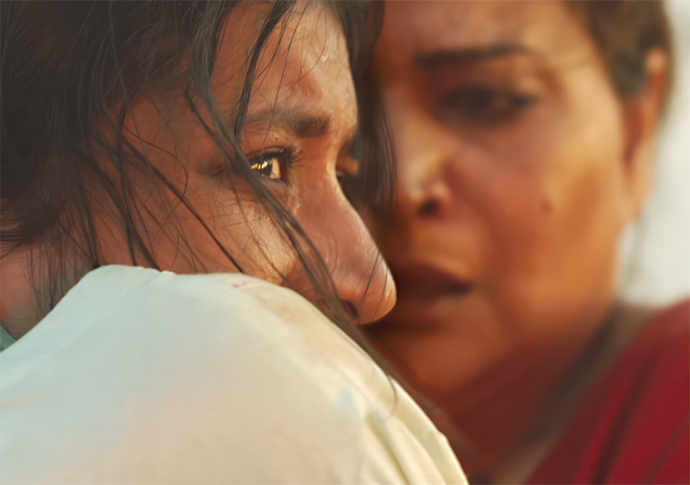In Flames: grief encounter in a male-dominated society
Film shows how women – and men – suffer in patriarchal set-up
Thursday, 16th May 2024 — By Dan Carrier

In Flames [Blue Finch Film Releasing]
IN FLAMES
Directed by Zarrar Kahn
Certificate: 15
☆☆☆☆
KARACHI, Pakistan, and a family in mourning. We meet mother Fariha (Bakhtawar Mazhar) and her daughter Mariam (Ramesha Nawal) as grieving rites are followed.
Hidden in the dead grandfather’s bedroom and watching cartoons is little brother Bilal (Jibran Khan). A telling moment early on appears when Mariam tells this child, significantly younger than she is, that he is now the man of the house, the boss.
We learn that the grandfather had helped the family following his son’s death – but when Uncle Nasir (Adnan Shah Tipu) appears to offer all manner of too-good-to-be-true help, we see the pressure the two women are going to be put under by clawing male relatives.
Nasir says he’ll cover the family debts of Fariha if she signs some documents for him. Mariam immediately smells a rat.
It’s hardly surprising she may have a deep suspicion. Her lived experience tells her to do so – and we are shown what women in Pakistan face when a brick is thrown through her car window, apparently in protest that she is driving.
More male intrusion comes in the form of love-struck student Asad (Omar Javaid), though at least he wants to show affection instead of oppression.
This all creates a sense of claustrophobia.
As Mariam and Asad get to know one another, the film begins to tip into something harder to understand and scarier for it. Mariam begins to doubt her judgement and what she sees.
Like all good horrors, there are tells in the opening acts, a sense that something is a little off, but quite what will keep you guessing.
What is plain to see is the way the male-dominated Pakistani society causes all manner of problems. It’s the women who suffer, but the patriarchal set-up also stops men from developing emotionally, and reveals just how detrimental it is for everybody.
Nawal’s performance makes the second half intriguing. She gives Mariam a genuine sense of fear, doubt, madness: just as conspiracy theorists believe the truth is hiding in plain sight and it’s just how you look at it, Mariam has to fight a society where gender relationships are not based on anything rationale.
If that’s the case, she asks, why should anything else that happens in such an unreasonable society be believable?